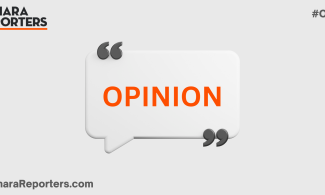
Never before in Nigeria's history has there been such religious division in politics. The ruling party has now broken this record and is about to do the worst in Kaduna State. They successfully sowed the poisonous seed of religious politics of Muslim-Muslim, Christian-Christian tickets, and so on. And the weak among us have fallen victim to this ruse.
A commoner desires food on his table, the safety of his family, and equitable opportunity for all. But, the ruling party has succeeded in substituting this shared desire with the desire to see another person of the same religion win an election. This is risky because it might lead to social separation and polarisation.
This concept of a Muslim-Muslim or Christian-Christian ticket might foster a "us against them" mentality among various religious communities. It can subsequently rise to tensions, confrontations, and even violence within religious communities, as well as the erosion of democratic ideals like tolerance, pluralism, and respect for difference.
It is common knowledge that the religious leaders that are furiously declaring to vote for some candidates are not saints or immune to personal biases or political leanings. Thus, they are not the last prophet and can never be. They may use their platform to promote their agendas rather than what is best for the country.
Another danger of such politics along religious lines is that it can distract from important issues that affect society as a whole. Instead of focusing on issues such as security, economy, education, and healthcare, our politicians may use religious issues to distract from their shortcomings and appeal to their base. We had seen this before when we were calling for #SecuretheNorth.
As individuals, we must reject the temptation to be influenced by a religious or political discourse that aims to divide us. Rather than blindly obeying the mandates and terms of individuals who are in no way, shape, or form saints, we should endeavor to understand the issues that concern us and make informed decisions and political choices based on our values and beliefs. Following the religious leaders' rhetoric blindly regarding elections is more likely to cause issues than provide solutions; it also creates a system in which a few people hold disproportionate power and authority in deciding who to win or not to win in an election.
To build the future of a nation, you must set your foundation strong, and the strong foundation of building a nation never lies on the whims of religion or ethnicity; instead, it only lies on the footing of competency, the rule of law, and tolerance. This requires us to transcend our differences and focus on what unites us rather than what divides us and our desire for a better future for ourselves. Anything less than that is antithetical to the rational thought of good thinking society.
Although Nigeria is a secular state, and we have successfully defeated Boko Haram, which wished to establish a caliphate state, and IPOB, which wished to establish a tribal state, I am not sure if Nigeria can resist a religious division promoted by our politicians, particularly the ruling party, which enjoys support from among our weak souls and happens to be the majority. Thus, the issue is about more than who wins or loses the election, particularly in Kaduna State next week. The issue will be how we can stand our ground and fight this furious nonsense of religious politics promoted by our politicians, churches, and mosques after next week's election.
While religion can be a source of strength and inspiration for many people, it should not be used as a tool for political division and conflict, and any attempt by any politician, political party or religious leader to divide us or incite hatred against one-person, political party, or group of people must be resisted and resisted by all.
Furthermore, the electorate should be holding accountable those individuals who promote the agenda of religious politics. We should reject politicians and religious leaders who use religion to promote divisive agendas and instead support those who promote unity, tolerance, and respect for all.
Written by
Aminu Bello PhD, SFHEA,
Department of Computer Science, York St John University, UK.